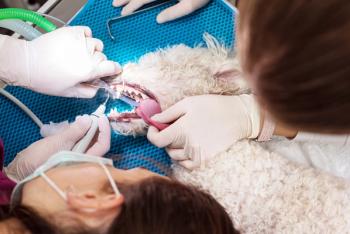
K9s for Warriors: Saving the lives of veterans with PTSD
Program pairs service dogs with former soldiers who are battling to return to normal life.
To the veterans who participate in the K9s for Warriors program, a dog is more than a companion. A dog a lifesaver. Many recent veterans who served in combat in Iraq and Afghanistan are coming home to emotional turmoil in the form of severe post-traumatic stress disorder (PTSD). With the strife of PTSD, 22 veterans are dying by suicide every day, according to the Department of Veterans Affairs (VA). But K9s for Warriors dogs are turning those lives around.
In the early 1980s, Leo K. Bustad, DVM, dean of the Washington State University College of Veterinary Medicine, founded the Delta Society, an organization that promotes the benefits of the human-animal bond. A pioneer in the field and the Delta Society's first chairman, Bustad helped the concept to flourish across the country. Not just dogs but animals of various species have provided therapy to homebound elderly people, brightened the days of kids in hospitals, and provided assistance as fully trained service dogs to men, women and children with diseases ranging from blindness to multiple sclerosis. With their “sixth sense,” dogs are now assisting Iraq and Afghanistan war veterans with combat-related PTSD.
What is PTSD?
PTSD expert Tina Jaeckle, PhD, LCSW, BCETS, FNCCM, an associate professor of sociology and criminology at Flagler College in St. Augustine, Florida, found herself drawn to K9s for Warriors when she realized that she could assist the organization's veterans by using her trauma and crisis expertise to help train K9s staff members. First she was a volunteer, then she served on the board of directors, and now Jaeckle sits on the organization's advisory board.
PTSD defined
The official criteria for post-traumatic stress disorder (PTSD) were updated in 2013 by the American Psychiatric Association in the DSM-5 (Diagnostic and Statistical Manual of Mental Disorders, fifth edition). According to its current definition, PTSD involves a history of exposure to a traumatic event, along with symptoms from each of four symptom clusters: intrusion, avoidance, negative alterations in cognitions and mood, and alterations in arousal and activity. Clinicians also look at duration of symptoms, the individual's level of functioning, and whether symptoms can be attributed to a substance or medical condition when making the diagnosis.
“Veterans from Iraq and Afghanistan struggle quite a bit before they ever come to K9s for Warriors,” Jaeckle says. “PTSD is a debillitating mental illness that is very misunderstood in our society.” In 2013, the mental health community redefined its criteria for PTSD, helping to establish its current diagnosis (see “PTSD defined” at right).
“While the awareness has increased for individuals living with PTSD, there is a great deal of work that needs to be done in terms of public education,” Jaeckle says. “I talk to many groups about what these veterans are going through. I let them know that they've gone through a terrible trauma, through numerous deployments and intense guerilla warfare. All of these facts have produced mental anguish, which makes the PTSD they're suffering much more serious.”
K9s for Warriors' beginnings
K9s for Warriors, based in Ponte Vedra Beach, Florida, is a 501(c)3 organization that opened its doors in January 2011 and had its first graduate complete the program in September of that year, says Todd Galley, the organization's chief financial officer. Galley's mother-in-law, Shari Duval, founded K9s for Warriors and is now its president.
Galley's brother-in-law, Bret Simon, is a 13-year veteran of the Cincinnati Police Department K-9 unit and spent two tours in Iraq as an independent bomb-dog handler. Though as an independent government contractor he was never diagnosed by military doctors, Simon seemed to suffer from severe PTSD after returning to the States, becoming isolated and depressed, his family members say.
“At that time his mother, Duval, had two dogs of her own,” Galley says. “Duval noticed that Simon would only come out of his shell when he would come to his mom's home and be around the dogs. The dogs changed Simon's whole personality.”
Duval, who had been involved with various philanthropic organizations for years, founded K9s for Warriors as a result. At first her goal was to assist Simon, who later also became invested in the organization. Eventually K9s for Warriors became a three-week training program for groups of veterans who had come home from combat with severe PTSD. During the three-week period, the veteran stays with Duval and other family members and in turn is supplied with a PTSD service dog.
“K9s for Warriors has maintained their very personal family atmosphere with the veterans,” says Roxanne Cheek, DVM, another advisory board member who provides her veterinary services to the organization. Initially Cheek was involved in fundraising but then came on board as one of two veterinarians, mainly doing surgery.
Most K9s dogs are from shelters or surrendered by owners, and many come to the organization intact sexually. Every month Cheek visits the facility to examine the dogs, possibly spay or neuter a dog or two, and take care of any other veterinary needs they have. As a mobile veterinarian with a van, she can easily pull up onto the property, run the dogs into her portable veterinary clinic, and treat them on site.
“I've met some of the warriors and know a lot of their dogs,” Cheek says. “I just love hearing all the stories, that with their companion service dogs, the [veterans] reduce taking medications for anxiety. Their wives will report that they're just a new person; their marriage relationships improve.”
Cheek says a lot of the healing process is the veterans' interaction with their service dogs, but they also experience camaraderie with their fellow veterans at the facility and receive unconditional love from the family and the team. Plus, since K9s for Warriors gets a lot of its dogs from shelters, the organization is providing homes for the dogs. “It's a ‘win-win' for both the dogs and for the soldiers,” she says.
Training regimen
A dog is fully trained-a six-month process, on average-as a service dog before it becomes involved with a veteran through the organization, Galley says. The training regimen first instills obedience, teaching the dogs to sit, stay and heel as well as to block and cover. “The blocking procedure is to combat the veteran's space issues,” he says. The dog will put itself between the veteran and an approaching person, protecting the veteran and helping him feel comfortable with the “intruder” in his space, serving as a barrier. The dog will actually step toward the person if he or she approaches the veteran too closely or quickly.
When covering, the dog faces any person coming up to the veteran from behind, as when a veteran might be using an ATM. The dog may pull, moving the veteran away from the intruding person, or simply alert the veteran to another person's presence.
The dog is also trained as a brace, whereby the veteran can put her hands on the dog to “brace” herself and steady herself from falling. Certain dogs, depending on the veteran's needs, can also turn on light switches and even pick up fallen credit cards or walking canes. Other than food-preparation spaces and surgical operating areas, K9s for Warriors dogs may go anywhere with their veteran partner, as per the American Disabilities Act.
The dogs used in the K9s for Warriors program are primarily “friendly public-perception” breeds-Labradors, golden retrievers, Labradoodles, goldendoodles, German shepherds and mixed breeds. Chows, Rottweilers, Dobermans and pit bulls are not used since they can be negatively perceived by the public.
“When the veteran is out with the dog, it's important for the dog to give off ‘people-friendly' vibes,” Galley says. “The veteran, as a PTSD patient, is already feeling in a hostile situation, and therefore the dog must portray calmness. A dog that is not already publicly accepted would tend to further isolate the veteran, making them feel standoffish and heightening their PTSD.” A friendly Lab provides that duty.
Jaeckle says dogs have an inherent sense when someone is anxious-they're even able to sense that anxiety before a human being will. “The veterans not only bond with their dog, but also receive a partner who unconditionally loves them,” she says. “When they're having a panic attack or a nightmare or are fearful, the dogs are always going to be there. We've taken the bond between dog and man that has existed forever and fine-tuned it, to make it specific to the warrior soldiers themselves and what they need.”
Veteran meets dog
Once a veteran becomes associated with K9s for Warriors, he or she begins the training process. The veterans spends three weeks at the facility, going through a one-day orientation before being presented with their dog, Galley says. Prior to that time they have no idea which dog they will unite with.
“Once they receive their dog, our four staff trainers work with the veterans to help them get the bond initiated-the most important thing during that first 24 hours,” Galley says. “On that first day, though the veterans want to begin their work in earnest, they do not go through any training-not even sit, stay. It's solely orientation.”
As the weeks proceed, the veterans and the dogs become more comfortable with each other. “At first, the veteran warriors learn what the dog is going to do for them (block, cover, brace), then everything changes; situational training begins,” Galley says.
During the training period the program puts the veterans and dogs in a variety of situations. “When they leave after their three-week training, we want them to know that they're going to be able to build rapport with their dog and the dogs will do the necessary things to assist them,” Galley says. The veterans go to stores with their dogs, run errands that reflect their normal everyday chores and routines, eat out at restaurants.
“We are trying to get them in normal everyday situations, trying to get them reintegrated into society,” Galley says. “When they go back to these places, in their mind they're going to say, ‘It's OK if I need to go to Walmart'; ‘It's OK if I'm going to be taking my family out for a meal.'”
At the end of the three-week period, the veterans are given identification cards to acknowledge that they've received certification, completed their training, and that they and their dog are a recognized training team.
Looking ahead
Recently, Congressman Steve Stivers (R-Ohio) introduced legislation that would establish a dog training program for veterans with PTSD. “As a service member myself, I know that there are difficulties with transition, the epidemic of PTSD, and other issues with integrating into civilian life,” Stivers says.
Stivers' bill would create a pilot program to set up five VA facilities in contract with local therapeutic dog organizations, such as K9s for Warriors. This would provide veterans with PTSD and other serious injuries the opportunity to obtain canine therapy. The organizations would work with the VA to ultimately help train the dogs to become service dogs.
“There are studies that show that canine therapy really works,” Stivers says. “Kaiser-Permanente did a study that showed that when veterans used a therapy dog, they had fewer symptoms of PTSD, less depression, better interpersonal relationships, a lower risk of substance abuse, and better overall health and mental health.”
Anyone who has ever had a dog and had a rough day can attest to the fact, Stivers says. “Once you spend a few minutes petting your dog, it puts everything in perspective,” he says. “Dogs improve people's mental health, their perspective, and their ability to relate not just to animals but to people. For the veterans, it's just great for their mental health.”
Stivers plans to try to get the legislation rolled into this year's National Defense Authorization Act or another appropriations bill. “I'm going to work my tail off to make sure it happens,” he says-perhaps relying on his own dog to keep his spirits up during the process. “They say if you want a friend in Washington, get a dog,” Stivers says.
In addition, Jaeckle has started a research program to take a look at the effectiveness of K9s for Warriors over time. “There has been some data collected, but we need to do it right,” Jaeckle says. “To bring some validity to what they're doing is the study's goal.
“I've been in this field for more than 25 years,” Jaeckle continues, “and I have yet to see anything as powerful as what K9s for Warriors is doing for the veterans they serve.”
Real-life dog-veteran stories
Jason and Axel
Jason, a Marine Corps veteran, and his assistance dog Axel. Photo courtesy of K9s for Warriors.Jason, an Iraq veteran who served with the U.S. Marines, returned home with severe post-traumatic stress disorder (PTSD). Agoraphobic, he'd stay trapped in house for months at a time. He would not take his wife and three children out to eat or go to his kids' soccer games. He was taking massive amounts of medication for depression and anxiety.
After obtaining Axel, a 5-year-old German shepherd, his life turned around. He became fully involved with his family again and significantly reduced his intake of medications.
Today, with Axel, Jason tours the country speaking about K9s for Warriors and the plight of Iraq and Afghanistan veterans who struggle with the challenge of severe PTSD. Jason has passed the third anniversary of his involvement with K9s for Warriors and has promoted a golf tournament to benefit the cause.
These are all things that would not have been possible without Axel's assistance. The dog takes the onus off him as the public shifts its attention from Jason and his PTSD disability to Axel, a certain ice-breaker.
“I'd be dead if it weren't for Axel,” Jason said recently in a TV interview.
Todd Galley, chief financial officer of K9s for Warriors, says Jason's story resonates among the 154 graduates of K9s for Warriors.
“Ninety percent of them would tell you that exact same thing,” he says.
Melissa and Chauncey
Melissa and Chauncey, graduates of the K9s for Warriors program. Photo courtesy of K9s for Warriors.Melissa also had severe PTSD after numerous deployments in Iraq. When she entered the K9s for Warriors program, she had low self-esteem and was not doing well mentally or emotionally. She tended to isolate herself, not taking part in her children's activities.
Now with her dog Chauncey, Melissa has turned her life around. She is the chairwoman of the Toastmaster chapter of K9s for Warriors in Tennessee. After being unwilling to talk or be involved in any activity, she's now part of an organization known for public speaking. Chauncey has brought her out of her shell.
“There are brothers, sons, mothers, fathers that are getting back involved in society and family,” Galley says. “Whether it's coaching their son's softball game, going to holiday functions with family, things they did not do before they're doing now, with the help of their K9s for Warriors dogs.
“You see numerous cases, over and over again, of veterans literally coming back to life,” Galley continues. “They're going back to college, getting jobs, being fully involved across the board. That's the key-that's why we do what we do.”
For more information about the K9s for Warriors program, visit
Ed Kane, PhD, is a researcher and consultant in animal nutrition. He is an author and editor on veterinary topics with a background in horses, pets and livestock. Kane is based in Seattle.
Newsletter
From exam room tips to practice management insights, get trusted veterinary news delivered straight to your inbox—subscribe to dvm360.




